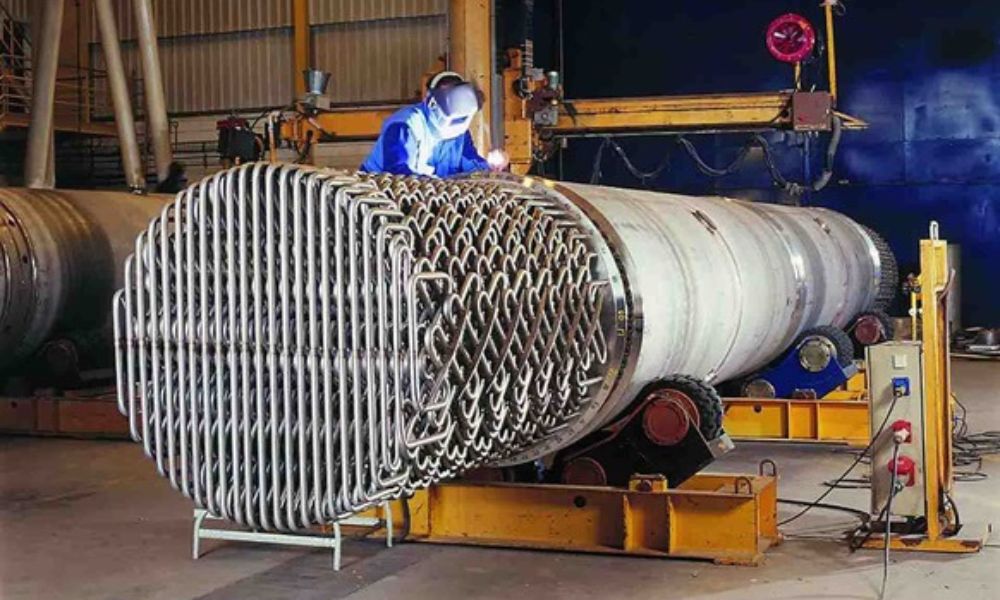Reactor & Heat Exchangers – Essential Equipment for Chemical and Industrial Processes
Reactor and heat exchangers are integral components in chemical and industrial operations, playing a crucial role in facilitating chemical reactions and transferring heat efficiently. These devices are used in various industries, including petrochemical, pharmaceutical, food processing, and energy production, where precision, efficiency, and durability are paramount.
Reactor – Key to Chemical Reactions
A reactor is a vessel or system where chemical reactions take place under controlled conditions. Reactors are designed to handle different types of reactions, such as catalytic, polymerization, or fermentation, and are essential in producing everything from pharmaceuticals to fuels. The efficiency and safety of a reactor depend on factors such as temperature control, pressure, and the mixing of reactants.
Types of Reactors:
Batch Reactors:
- Ideal for smaller production runs, batch reactors operate in discrete cycles. They are commonly used in industries like pharmaceuticals, specialty chemicals, and food production.
Continuous Reactors:
- These reactors operate continuously, allowing for a constant flow of reactants and products. They are often used in large-scale industrial processes like oil refining and chemical manufacturing.
Plug Flow Reactors (PFR):
- PFRs are used when high precision is needed for the conversion of reactants. They are popular in the production of fine chemicals and polymers.
Stirred Tank Reactors (STR):
- STRs are versatile reactors that use mechanical agitation to enhance the mixing of reactants, ensuring even temperature distribution. These are commonly used for fermentation processes, polymer production, and other chemical reactions.
CSTR (Continuous Stirred-Tank Reactor):
- In CSTRs, reactants are continuously fed into the reactor, and products are removed, making them ideal for large-scale continuous processes where mixing is crucial.
Heat Exchangers – Efficient Heat Transfer
Heat exchangers are used to transfer heat between two or more fluids without mixing them. These devices are essential in a wide variety of industries, including chemical processing, power generation, HVAC systems, and oil refining. They help maintain temperature control in reactors and other industrial processes, improving efficiency and reducing energy consumption.
Types of Heat Exchangers:
Shell and Tube Heat Exchangers:
- These are the most common type of heat exchangers, consisting of a series of tubes inside a larger shell. They are ideal for high-pressure applications and are widely used in chemical, petrochemical, and energy industries.
Plate Heat Exchangers:
- Composed of multiple thin plates stacked together, plate heat exchangers are compact and offer high heat transfer efficiency. They are often used in industries where space is limited, such as food processing and pharmaceuticals.
Air Cooled Heat Exchangers:
- These heat exchangers use air to cool fluids, making them an excellent choice for environments where water is scarce or unavailable, such as in remote areas or oil rigs.
Double Pipe Heat Exchangers:
- Consisting of two concentric pipes, double pipe heat exchangers are used in small-scale applications where a simple design is required. They are cost-effective and ideal for low-flow operations.
Adiabatic Heat Exchangers:
- In these exchangers, no heat is lost to the surroundings, making them highly efficient. They are primarily used in large-scale cooling applications, such as power plants and refrigeration systems.
Key Features and Benefits of Reactors & Heat Exchangers:
Reactor Features:
Precise Temperature & Pressure Control:
Ensures optimal reaction conditions, enhancing yield and safety.
Customizable Designs:
Reactors can be designed to meet the specific needs of different chemical reactions, whether for small-scale lab experiments or large industrial production.
Durable Construction:
Built from materials like stainless steel, reactors are designed to withstand high temperatures, pressures, and corrosive environments.
Heat Exchanger Features:
High Heat Transfer Efficiency:
Designed to maximize heat exchange while minimizing energy consumption.
Compact Design Options:
Heat exchangers like plate exchangers are designed for use in spaces with limited room or where a high surface area is required for efficient heat transfer.
Corrosion Resistance:
Manufactured with materials that resist corrosion, ensuring longevity and reliability in harsh environments.
Applications of Reactors & Heat Exchangers:
Applications of Reactors:
Pharmaceutical Industry:
Reactors are used for the synthesis of active ingredients and the production of vaccines and other pharmaceutical products.
Petrochemical Industry:
Used for refining crude oil, producing polymers, and generating synthetic fuels.
Food and Beverage Industry:
Reactors are essential for fermentation, distillation, and chemical synthesis processes.
Energy and Power Generation:
Reactors are used for the production of biofuels and energy through chemical processes.
Applications of Heat Exchangers:
Power Plants:
Heat exchangers are crucial in converting heat into usable energy by transferring heat from the exhaust gases to the fluid systems.
HVAC Systems:
Used for heating and cooling buildings by transferring heat between fluids and the air.
Oil & Gas Industry:
In refineries and offshore platforms, heat exchangers help in the efficient cooling and heating of fluids during processing.
Food Processing:
Heat exchangers are used to maintain product temperature during pasteurization and other critical stages of food production.
Why Choose Our Reactor & Heat Exchanger Solutions?
Customized to Your Needs:
We design and manufacture reactors and heat exchangers to suit the specific needs of your industry, ensuring efficiency and performance.
Quality Assurance:
Our equipment is built to meet the highest industry standards, ensuring reliability, durability, and safety in operations.
Energy Efficient:
Our solutions are designed to optimize energy usage, reducing operational costs and environmental impact.
Comprehensive Support:
We provide full installation, maintenance, and technical support, ensuring smooth integration into your operations.

